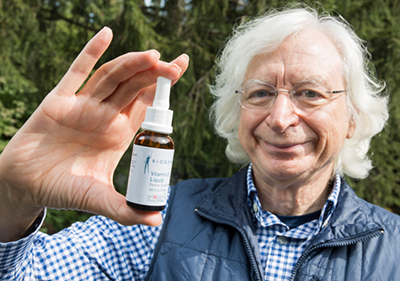Boston University School of Medicine Study Finds Vitamin D May Help Patients Fight COVID-19 Infections, But Some Question These Conclusions
Clinical laboratory managers may want to follow the debate that surfaced shortly after publication of the study in a peer-reviewed journal, when editors of the journal issued concerns over the researchers’ claims
Virologists and medical laboratory scientists continue to investigate ways the SARS-CoV-2 coronavirus can be defeated using the body’s own defenses in conjunction with medical treatments and a possible vaccine. Now, researchers at the Boston University School of Medicine have discovered that higher levels of vitamin D in the blood may improve chances of recovering from a COVID-19 infection.
In their paper, titled, “Vitamin D Sufficiency, a Serum 25-Hydroxyvitamin D At Least 30 Ng/Ml Reduced Risk for Adverse Clinical Outcomes in Patients with COVID-19 Infection,” the Boston University researchers suggest that sufficient levels of Vitamin D may help reduce complications, illness intensity, and death among COVID-19 patients.
“This study provides direct evidence that Vitamin D sufficiency can reduce the complications, including the cytokine storm (release of too many proteins into the blood too quickly) and ultimately death from COVID-19,” Michael F. Holick, PhD, MD, Professor of Medicine, Physiology and Biophysics at Boston University School of Medicine and one of the authors of the study, told SciTechDaily.
Holick is well-known in the scientific community for his many published studies on Vitamin D. In 2018, Kaiser Health News and The New York Times published a retrospective on Holick and his advocacy on behalf of Vitamin D, titled, “The Man Who Sold America On Vitamin D—and Profited in the Process.” In that story, Holick acknowledged working as a consultant for several organizations, including Quest Diagnostics in a relationship that dates back to 1979. KHN and NYT noted that Quest Diagnostics performs Vitamin D tests.
The Boston University researchers published their study in PLOS ONE, a peer-reviewed open-access scientific journal published by the Public Library of Science (PLOS). The paper’s apparent conclusions, however, invoked an “expression of concern” from the journal’s editors, which, along with direct responses from the Boston University researchers, can be read on PLOS ONE.
Can Vitamin D Save Lives?
To perform their research, the Boston University researchers examined the Vitamin D levels of 235 patients who had been admitted to a hospital with a SARS-CoV-2 infection. The patients were then tracked for clinical outcomes, including:
- severity of the infection,
- becoming unconscious,
- difficulty breathing,
- hypoxia, and
- death.
Blood samples were also analyzed for the number of lymphocytes and inflammatory markers. The researchers compared the collected data between patients who were sufficient to those who were deficient in Vitamin D levels.
They determined that patients over the age of 40 who were Vitamin D sufficient were 51.5% less likely to die from a COVID-19 infection than those who were deficient in the vitamin.

How Vitamin D Works and Why It’s So Important
In a fact sheet, the National Institutes of Health (NIH) recommend that adults between the ages of 19 and 70 take 15 micrograms (mcg) or 600 International Units (IU) of Vitamin D per day. Adults over the age of 70 should increase that amount to 20 mcg or 800 IUs per day.
According NBC News, Americans spent $936 million on supplements in 2017, which was nine times more than the previous decade. That article also stated that medical laboratory testing for Vitamin D levels have exponentially increased over the years. More than 10 million tests for Vitamin D levels were ordered for Medicare patients in 2016 at a cost of $365 million, which represents an increase of 547% since 2007. Currently, approximately one in four adults over the age of 60 in the US take Vitamin D supplements.
The NIH fact sheet notes that Vitamin D is a nutrient found in cells throughout the body and is needed for good health and to maintain strong bones. Individuals who are deficient in Vitamin D may develop soft, thin, brittle bones, as well as rickets in children and osteomalacia in adults. Vitamin D also helps the immune system fight off invading bacteria and viruses, helps nerves carry messages between the brain and other body parts, and helps muscles move. It can also play a role in warding off osteoporosis in older adults.
Very few foods naturally contain Vitamin D. The best dietary sources for the vitamin are fatty fish such as salmon, tuna, and mackerel, and foods fortified with Vitamin D, such as milks, some breakfast cereals, and yogurt. Being outside on sunny days is another way to obtain Vitamin D, as the body makes the vitamin when skin is directly exposed to the sun.
The Boston University study outlines the advantages of having sufficient Vitamin D levels, as well as how the vitamin may help ward off and possibly lessen the effects of infections like COVID-19, though those conclusions have been called into question.
Nevertheless, individuals who are deficient in the vitamin may want to take a supplement or get plenty of sunshine, just to be on the safe side. And clinical laboratory managers will want to keep in mind that over the years “the steady increase in physician and patient demand for Vitamin D tests has kept most clinical and pathology laboratories scrambling to maintain turnaround times and quality,” which Dark Daily reported in “Why Vitamin D Continues to Be the World’s Fastest-Growing Clinical Laboratory Test.”
—JP Schlingman
Related Information:
Sufficient Levels of Vitamin D Significantly Reduces Complications, Death Among COVID-19 Patients
The Man Who Sold America On Vitamin D—and Profited in the Process
Low Levels of 25-Hydoxyitamin D Linked to COVID-19 Risk
Vitamin D: Fact Sheet for Health Professionals
Vitamin D: Fact Sheet for Consumers
Selling America on Vitamin D—and Reaping the Profits
Millions of Americans Take Vitamin D. Most Should Just Stop
Why Vitamin D Continues to Be the World’s Fastest-Growing Clinical Laboratory Test




